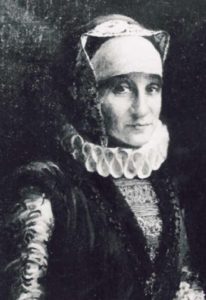The Woman Who Transformed Yiddish Literature and History
 Gluckel (or Glikl) bat Yehuda Leib (c. 1646-1724) was born in Hamburg to a wealthy, influential, and deeply religious Ashkenazi family. Although all Jews were expelled from Hamburg in 1649, her father was given permission to return because he was so highly respected by the German authorities. Gluckel was given a strong education, and got married at age 14 to Chaim of Hameln. The young family soon started a successful diamond and pearl business. When her beloved husband passed away, Gluckel took over the business. She became famous as one of the few women in Europe that ran her own sprawling enterprise, and that travelled alone to trade fairs and through European markets. She still took care of all 13 of her children! Gluckel eventually remarried, reluctantly, to a banker named Cerf Levy. Two years later, Levy lost his fortune, and wasted Gluckel’s too. After 12 years of marriage, Levy died and left Gluckel a widow for the second time. She slowly recovered from her losses, and lived out the rest of her life in relative solitude. Most significant for historians, Gluckel kept a detailed diary for many years, providing us with an inside look into both European and Ashkenazi Jewish life of the 17th and 18th centuries. The seven journals she wrote touch on important themes and describe key historical events, and are considered among the greatest Yiddish literary works of all time. One of Gluckel’s great-granddaughters was (former Jew of the Week) Bertha Pappenheim, who produced a German translation of Gluckel’s diaries (and is also the woman in the portrait at right, where she dressed up as Gluckel). The translation was hugely popular, and an English version was produced in 1932, as well as a fictional adaptation in 1941, and a newer translation in 2019. Another one of Gluckel’s grandchildren was renowned rabbi Samson Raphael Hirsch. In 2016, a street in Hamburg where she lived as a child was named after her (Glückel von Hameln Straße). Her yahrzeit is on the second day of Rosh Hashanah.
Gluckel (or Glikl) bat Yehuda Leib (c. 1646-1724) was born in Hamburg to a wealthy, influential, and deeply religious Ashkenazi family. Although all Jews were expelled from Hamburg in 1649, her father was given permission to return because he was so highly respected by the German authorities. Gluckel was given a strong education, and got married at age 14 to Chaim of Hameln. The young family soon started a successful diamond and pearl business. When her beloved husband passed away, Gluckel took over the business. She became famous as one of the few women in Europe that ran her own sprawling enterprise, and that travelled alone to trade fairs and through European markets. She still took care of all 13 of her children! Gluckel eventually remarried, reluctantly, to a banker named Cerf Levy. Two years later, Levy lost his fortune, and wasted Gluckel’s too. After 12 years of marriage, Levy died and left Gluckel a widow for the second time. She slowly recovered from her losses, and lived out the rest of her life in relative solitude. Most significant for historians, Gluckel kept a detailed diary for many years, providing us with an inside look into both European and Ashkenazi Jewish life of the 17th and 18th centuries. The seven journals she wrote touch on important themes and describe key historical events, and are considered among the greatest Yiddish literary works of all time. One of Gluckel’s great-granddaughters was (former Jew of the Week) Bertha Pappenheim, who produced a German translation of Gluckel’s diaries (and is also the woman in the portrait at right, where she dressed up as Gluckel). The translation was hugely popular, and an English version was produced in 1932, as well as a fictional adaptation in 1941, and a newer translation in 2019. Another one of Gluckel’s grandchildren was renowned rabbi Samson Raphael Hirsch. In 2016, a street in Hamburg where she lived as a child was named after her (Glückel von Hameln Straße). Her yahrzeit is on the second day of Rosh Hashanah.
Shana Tova u’Metuka! Happy 5783!
17 Rosh Hashanah Facts Every Jew Should Know
7 Tips for Rosh Hashanah New Year’s Resolutions
The Origins and Meaning of Tashlich
Words of the Week
These are days of judgment as to whether we deserve anything. We only have a chance of encountering God when we allow Him into everything and educate ourselves to recognize Him in all we receive. Everything is a miracle, pure gifts we did nothing to merit: to live, to breathe, to eat and drink, to think, to laugh, to enjoy our friends and families… Rosh Hashanah is a day that protests the claim that we deserve anything. We stand naked before God and try to make ourselves at least slightly deserving of all these gifts by admitting that everything is a miracle.
– Rabbi Dr. Nathan Lopes Cardozo
